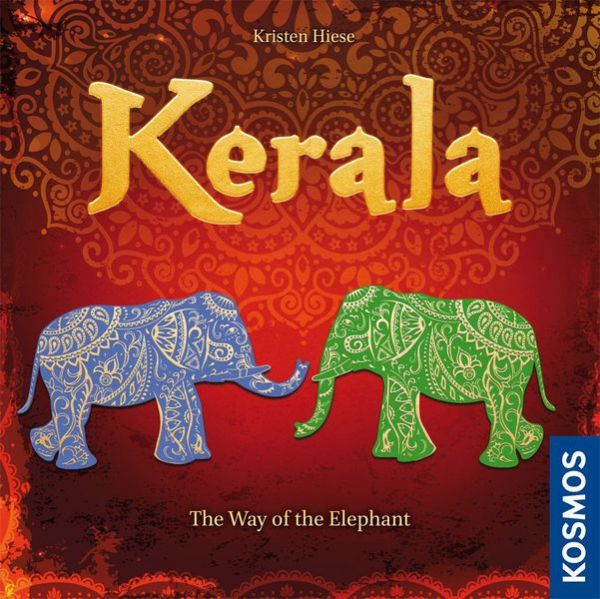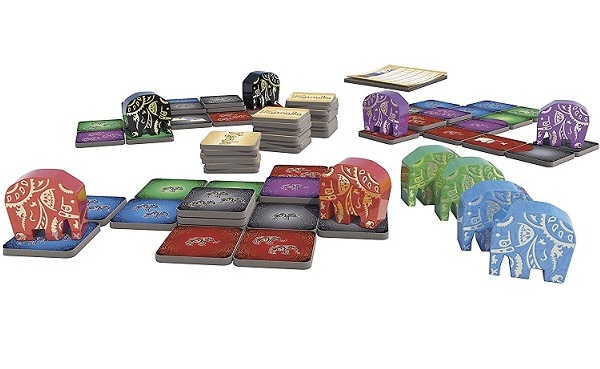Place Tiles with the Aid of Elephants in Kerala

It is the elephant festival, and you must draft colorful elephant tiles and play them to your tableau, in an attempt to create large groupings of single colors and lots of elephants.
Thames & Kosmos’s elephant-filled tile placement game is an abstract strategy game with a couple of unique tile placement rules that set it apart from similar games.
Gameplay
Each player chooses a color and takes that color’s two elephants and start tile. You place your start tile in front of you, and put your two elephants on it. The start of the game is the only time you can have both elephants on the same tile. The remaining tiles are put into the tile bag and mixed together.
Every round, the active player reaches into the tile bag and draws out tiles equal to the number of players. The active player then chooses one tile and places it vertically or horizontally adjacent to any tile which one of his elephants currently occupies, and then moves that elephant onto the new tile. You can stack tiles, placing your new tile on top of a tile adjacent to your elephant, and then moving the elephant on top of this stack. There is no limit to how many tiles can be in a stack.
After the active player has chosen, the player to his left chooses a tile and adds it to her own tableau, following the same rules. This continues until everyone has selected a tile. Twice per game you can choose to pass instead of selecting a tile, in which case the extra tile is discarded at the end of the round, although you earn a point at the end of the game for each pass you did not use. Once everyone has gone, the player to the left of the active player takes on the active player role for the next round and takes the tile bag.
Tiles come in one of five colors, and most of them show one to three elephants drawn on them. Your goal is to create a single grouping of each color in your tableau. At the end of the game you can only score one grouping per color — except for the color that matches your elephants, for which you can score two groupings. Any tiles you cannot score get discarded and you lose two points per tile you discard. If you have to discard a stack of tiles, each tile in the stack costs you two points. Players then score a point for each elephant shown on their scoring tiles.
There are three additional tile types. There is one which allows you, when placed, to move either one of your elephants to any other tile in your tableau, and one that allows you to move a tile or stack of tiles, from its current location to any other free location (you cannot stack it onto another tile), as long as an elephant is not on the tile, it is not currently surrounded on all four sides, and moving it would not split your tableau into two. Finally, there is the special tile type which is predominately one color but shows a secondary color along one side. If, at the end of the game, after you have discarded any necessary tiles, that side is adjacent to a tile of a matching color, then you earn five points. Players also lose five points at the end of the game for each color they do not have in their tableau. The player with the most points at the end of the game wins.

Review
Kerala is a game with easy to learn rules and a puzzle that is complex to master at its heart. Figuring out the best way to play your tiles, moving your elephants around, when to stack and when to accept loss of points in order to set up bigger scoring opportunities elsewhere, and adapting your strategy based on what tiles are drawn and which ones are available when it’s your turn to choose, is challenging but satisfying.
The tokens that allow you to move tiles and elephants help you to fix mistakes, and the stacking enables you to get more creative with tile placement, take a few more risks, and also ensures no one has as good as lost the game early on because of some bad tile draws.
There’s really no downtime, since as soon as a player has selected a tile, you can select one yourself as they’re placing theirs, and so on around the table. There is very little player interaction, however. You can draft tiles away from your opponents, but you have to be careful when doing this as it can easily hurt you as much as them if you draft a tile that’s difficult for you to place.
Aesthetically, the game is very attractive, with rich colors and large elephant pieces. You can easily fit all the components into the tile bag, making it very portable, but the game does come in a much larger box than is necessary.
Gameplay is fast and smooth and the mechanism of having to lay tiles adjacent to your elephants is a clever twist on the tile laying genre. Kerala is a lovely and elegant abstract board game, that’s a treat for both the eye and the mind.
Pros: Elephant tile placement rules, aesthetics, stacking rule
Cons: Limited player interaction, box is larger than it needs to be
Disclosure: we received a complimentary review copy of this game.







